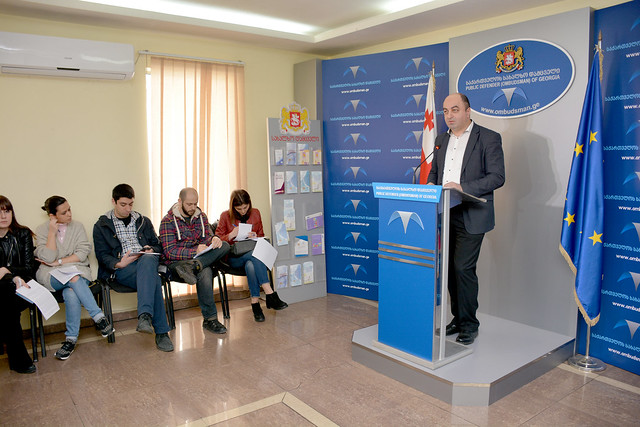Public Defender’s Proposal on Necessary Measures for Prevention and Reduction of Mortality among Children under Age of 5
On March 1, 2016, the Public Defender held a briefing about the necessary measures for the prevention and reduction of mortality among children under the age of 5.
On February 23 the Public Defender addressed the Government with a proposal with regard to the abovementioned issue. During preparation of the proposal, the Public Defender’s Center for Child’s Rights analyzed policies and legislations of ten European countries, on basis of which it presented a number of recommendations.
In his recommendation the Public Defender demands development of a strategy and an action plan for reduction of mortality of infants in Georgia; improvement of access to and functioning of children's health facilities, including equipment of facilities with appropriate infrastructure and devices, and addition of a special helicopter for reaching remote and mountainous areas; introduction of common regulations concerning the use of private and public medical vehicles; elevation of qualifications of the personnel and introduction of continuous education system; promotion and implementation of the care system for pregnant women; strengthening of the availability of information about necessary mechanisms for the protection of infant health, as well as about the maternal and child health services; introduction of a unified electronic database for processing and storing patients’ medical histories.
Although according to the data of the Ministry of Health, Labour and Social Affairs, the infant mortality rate has decreased compared to the previous years, the scales of the reduction are not satisfactory with respect to the European data and remains alarmingly high. 576 children under the age of five died in 2015 alone.
As per the data of the Inter-Agency Group of Child Mortality Estimation (IGME), mortality rate in developed countries is 6 per thousand live births, while in Georgia the rate is 12. The rate of maternal mortality is also high in Georgia – 36 per one hundred thousand.
Improper health services, lack of neonatologists, inadequate care system for pregnant women, including low qualifications of medical personnel, low level of parental awareness and other factors could be considered as the causes of infants’ deaths.
Gaps in access to services, poor-quality or delayed services due to geographical location are especially worrisome. For example, the UNICEF survey, carried out in 2013 to reveal the causes of infant mortality, showed that the death probability of infants living outside Tbilisi was 1.4 times higher than of those living in Tbilisi, while death probability of infants living outside Tbilisi, the weights of which were 1,500 grams or less, was 1.9 times higher in the period before being discharged from hospitals and 1.5 times higher after leaving hospitals.
Pursuant to the international and national standards, the state is obliged to ensure high-quality functioning of the system of protection of infant’s life and execution of effective implementation, as well as proper qualifications of the system’s personnel.
The recommendations of the UN Committee on the Rights of the Child (CRC) stress that the Committee is concerned about the high rate of premature births in Georgia and urges the state to allocate more resources to address the problems related to pregnancy and premature birth.
















